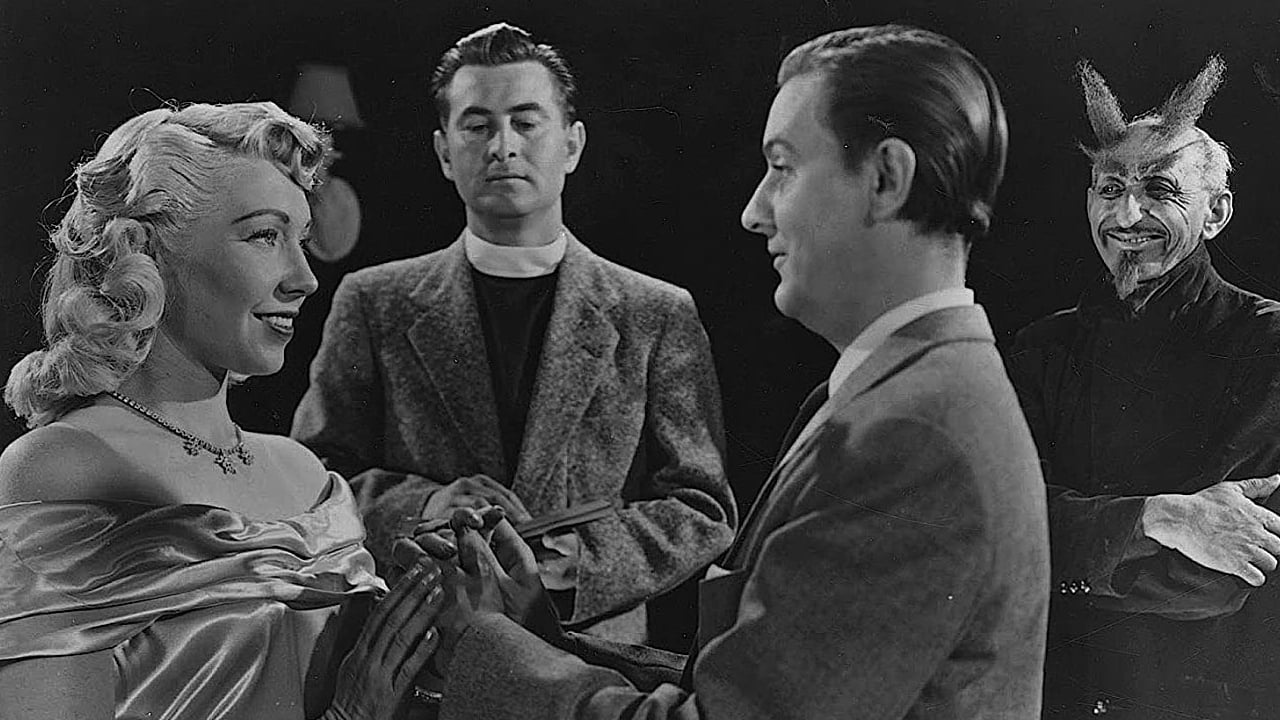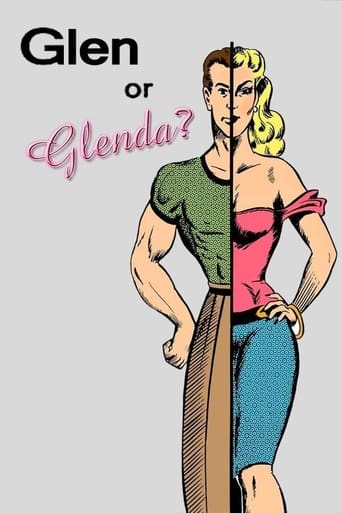adonis98-743-186503
"Glen or Glenda" tells two stories. One is about Glen, who secretly dresses as a woman but is afraid to tell his fiancée, Barbara. The other is about Alan, a pseudohermaphrodite who undergoes a painful operation to become a woman. Both stories are told by Dr. Alton, who also delivers an earnest lecture on tolerance and understanding. I still don't get why Bela Lugosi was in this film plus the whole movie feels like a bunch of scenes coming out of someone's twisted minds and that's probably what it is right? Easily Wood's worst movie. (0/10)
framptonhollis
Ed Wood's "classic" surrealist docudrama romance horror semi-autobio "Glen or Glenda" joins the ranks of films like "Eraserhead" and "The Holy Mountain" in terms of pure, unadulterated weirdness. It probably wasn't intended to be so bizarre and mindbending, and that's a large part of what makes it so great. It feels like an awkward and occasionally incoherent collaboration between David Lynch and Tommy Wiseau (one of the most unlikely pairs in cinematic history!!!), and, naturally, it is an entertaining stain on the carpet of filmmaking.
ironhorse_iv
For the 1950's Edward Wood was incredibly brave to make this movie about transvestites and sex change - dealing with two taboo subjects. It was made with real passion by someone who understood the issue, but it can be quite off the wall and dull, but its a hell of a lot more intelligent than a lot of the rubbish made today and costing millions of dollars to make. The opening message of Glen or Glenda reminds me of the opening message of Tod Browning's classic 1932 horror film Freaks. The first part of the film begins with a narrator (Bela Lugosi) making cryptic comments about humanity. In a way, Bela Lugosi plays the creator, watching the people moving by their own, making their own decisions. "Pull the Strings' meant everyone (puppeteer) is the master of their own destiny (puppets), by pulling the strings so as to control your destiny and bring it wherever you want it to be. These theological ruminations Ed Wood gives us are right up there with Ingmar Bergman's greatest films on the purpose of life and faith in our world. Edward Wood wanted to keep it open to religions who don't believe in the commonly accepted "God", or do not call their god(s) "God". "The Creator" is an umbrella term that doesn't offend any particular religion or belief set, nor does it truly suggest religion in the first place ("The Creator" could be anybody or anything). This way, he doesn't directly accuse religion for people not accepting transsexualism and transvestism, rather he accuses people's stubbornness. The Bela Lugosi portions of the movie seem like such an afterthought to the central story, which is too bad considering that they are also the most compelling. He put Bela in the film, because, at the time, the old man was sick, addicted to drugs, and badly in need of money, and he loved Lugosi so he tried to help him whenever he could. Sadly Bela wasn't in any shape to memorize the ingredients for an ice cube, let alone a movie script, even a bad one. The lines were feed to him, but some lines still didn't match what was being produce half of the scenes (Bisons running around in stock-footage is a example). Maybe a example of not being trampled by life or others. Another one is 'The Dragon at the doorstep' is maybe the mockery, people must fight against to be what he wants to be. Puppy dog tails and big fat snails are the transvestites of the world getting eaten (destroyed) by the Dragon, (mockery from people). The examples of people excuse for sex change, intro-cut with having cars and planes are just out there. This film has artistic merit to it with those lines. With Bela on film, the audience has a hard time figuring out who is the true narrator, due to another narrator later in the film. So it's felt like a story within a story. This part seem like a horror film, while the rest of the film seems like one of those "better ways towards clean living" type of short films made in the fifties that they showed to kids in school, only instead of promoting personal hygiene, this one is showing you how to justify your life as a transvestite.The film proper opens with Inspector Warren finding the corpse of a male transvestite named Patrick/Patricia, who has committed suicide. Wanting to know more about cross-dressing, Warren seeks out Dr. Alton, who narrates for him the story of Glen/Glenda and the viewers. Ed Wood himself was a transvestite playing Glen under the pseudonym 'Daniel Davis'. Glen is shown studying women's clothes in a shop window. Dr. Alton points out that men's clothes are dull and restrictive, whereas women can adorn themselves with attractive clothing with outrageous/ bizarre claims. Women's clothes comfy? In the days of the Iron Bra and the panty girdle? Glen is getting married to Barbara (Ed's real life girlfriend Dolores Fuller) who questioning if Glen is with another woman. Glen is being force to admit to Barbara about his wanting to wear women clothing. A bizarre dream sequence, containing some BDSM pornography, follows with Satan. Not really need. It ruins the film. Glen then decides to tell Barbara the truth. She proffers her angora sweater as a sign of acceptance. The second part of the story about Alan/ Annie is a letdown, not worth noting. The acting is quite poor, with different actors you can spot Ed Wood's trademark dialogue style.It's this type of pseudo-intellectual verbal non-stop talk that erupts from their mouths for no reason at all. Much like a person reading a book out-loud; there is an unnaturalness to it because we know, deep down in the depths of the human mind, that humans, such as us, do not talk like characters in a audio book. The random shots of things, like dramatic radiator are just odd to be in the film. Looking through the opening "credits," it included a "Music Consultant," rather than "composer," or "director." I have no idea what a "consultant" would be needed for, unless the music he used in this movie was canned or public domain. Found out it's the old theme song as the old Lassie TV show. The dub lines in post-production is funny. That phony "granny voice" is one thing that's laughable. Unfortunately the film doesn't broach the subject that gender Diaspora & transvestism aren't the same thing. Ed Wood who was probably a very nice man, but a not that good film maker. Working with what he had on a low budget, with a script he had to write in less than 2 days with production starting not long after- to say this was horrible is a understatement. It wasn't that bad. It actually seems pretty progressive for 1953. Rather watch a flaw film made with lots of enthusiasm than a mundane manufactured movie anyday. Just my opinion.
dougdoepke
Surprisingly, the movie's neither good nor bad-- it just doesn't register on the conventional spectrum. Instead it's just plain weird, terminally weird. It's like a highschool hygiene lecture wrapped in soft porno, all tossed into a surrealist dream. Really, Wood had all the guts in the world to lecture a 1950's audience on the subtleties of gender bending. That part is genuinely informative and worth a salute. I also liked the soft porn with the squirming girls in semi-undress. But I'm still wondering how that got released in 1953. Then there's Lugosi sitting in some corner of the surrealist universe, telling us to "Bevare of puppy dog tails…" and other hammy nonsense. I figure he was added for marquee value since the rest of the cast are a bunch of unknowns. But what's this thing Wood has for lightning bolts. It's like he says, "Stop the action, it's time for a lightning bolt", and makes just about that much sense. One thing for sure—you never know what's coming next. It might be a stampede of buffalo or a stroll down Ventura Blvd. in drag. And, my gosh, Wood (Glen and Glenda) looks so normal, you'd never guess he makes Salvador Dali seem absolutely conventional. I don't know what part of planet Wacko Wood hails from, but I do know it's no part of the known universe. Nonetheless, here's a fuzzy angora Oscar to Wood for just plain weirdness.

